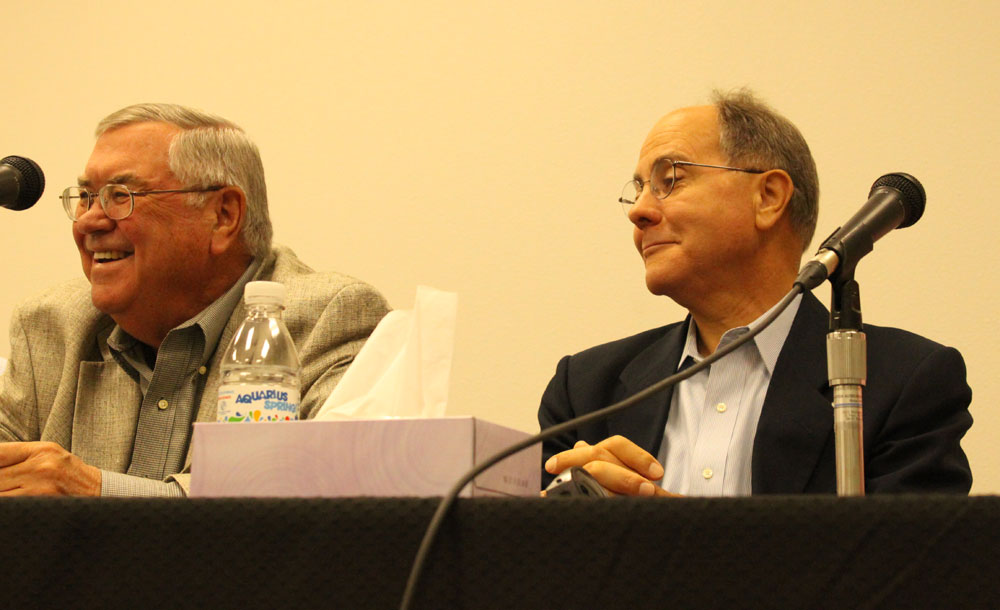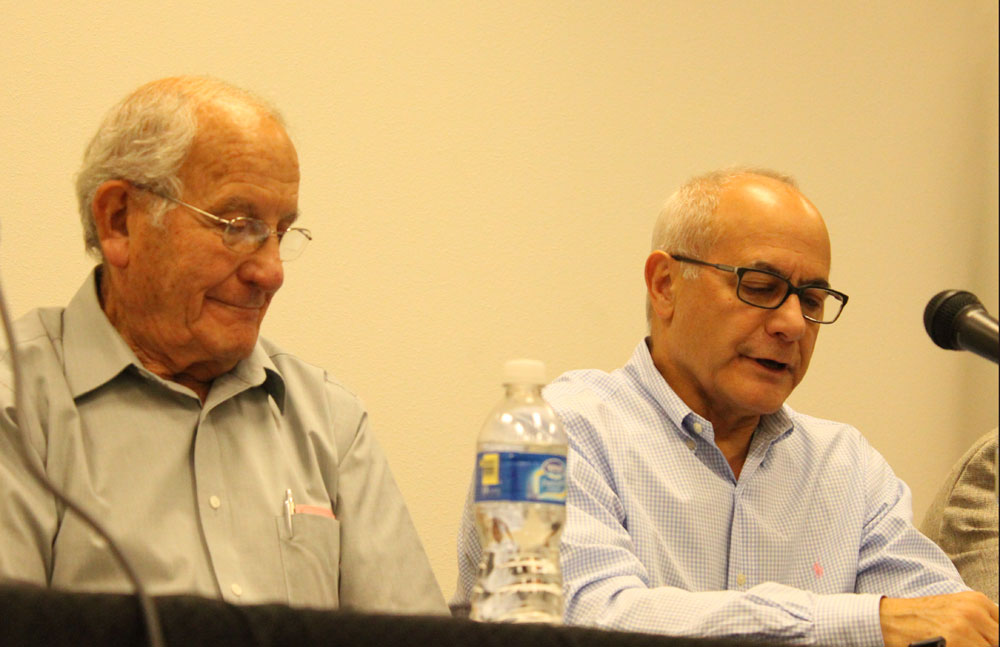EL PASO, Texas. — A purple box of tissues was passed around a table by former staffers of the family-owned Farah Manufacturing Company as they grew emotional remembering the glory days of the world’s largest manufacturer of men’s slacks.
The panelists told stories of their experiences and the family dynamic of El Paso’s 20th century garment-industry giant at the El Paso Museum of History on Saturday, October 9th. “It was a culture built around more of a personality of a family member, as opposed to a general family culture,” said former Farah vice-president of human resources, Dan Cruse.
The Department of History at The University of Texas at El Paso (UTEP) and the El Paso Museum of History combined their efforts to bring together former employees, close family friends and members of the Farah family, to tell stories of the time they spent with the Farah family and company.

Dan Cruse, former Farah vice-president of human resources, and Kenneth Farah, son of Willie Farah, remembered how his father ran the company in the 1960's. (Marko Morales/Borderzine.com)
Though a career in aviation was founder Mansour Farah’s dream, after World War I he began manufacturing shirts in 1920 with his wife by his side. As the Farah Manufacturing Company grew, Kenneth Farah, the grandson of Mansour and one of William (Willie) Farah’s sons remembered how his father ran the company in the early 1960’s.
“Today there are mechanisms that we would call on immediately that a family might consider employing in order to manage its relationship doing business. It didn’t exist then. It was whatever Willie decided he wanted to do after my uncle passed away. That was the rule,” said Kenneth, also a former company executive.
At one point, Farah was the second largest employer in the Sun City and a great help to both El Pasoans, as well as immigrants from around the world who struggled to provide for their families. The Farah company provided the sustenance that ushered them into the American dream.
An old black-and-white picture of the apparel company’s plant, which once sat alongside Gateway West in East El Paso, was held up by Kenneth. He fought back tears as the memories of his deceased father William, grandmother Hana, and particularly, uncle James crept into his speech. “There was no question when we were youngsters that Jimmy was in control of the place. I think the culture changed significantly when he passed away in 1964,” said Kenneth.
The company experienced rapid growth and significant change under the new direction of William Farah. Among the most innovative changes were the machines invented by William and used in the factories. One machine could press a jacket shoulder in one swift move. Another machine invented by William could perform the task of sewing pockets, belt loops and even zippers onto a garment. “His personality was the dominant culture of the company, It was a dynamic culture around a personality that was bigger than life” said Dan Cruse.
Along with a change in the company’s culture came a change in the attitudes of many employees in the 1970’s. Some 2,000 Farah employees seeking better representation by the Amalgamated Clothing Workers of America and better wages and job security, began a strike in the spring of 1972. This not only hurt production, it stunted the garment manufacturers’ growth.

Joe Shamaley and James (Jimmy) Farah were also part of the panel organized by UTEP Department of History and El Paso Museum of History. (Marko Morales/Borderzine.com)
Several union supporters were fired and the AFL-CIO struck back — only the third time in its history — with a nationwide boycott of the company’s products. Manuel Castañeda began working for Farah three years before the strike. “We started organizing the union in shipping,” Castañeda said. Some felt that rapid growth and Farah’s unwillingness to recognize the labor union, amounted to nothing more than the exploitation of minorities, most of them of Mexican descent.
Although the strike did in fact hurt the apparel giant, the worst was still to come. Farah’s sales took a nosedive, as did the price of the company’s stock. In 1973, Farah’s stock dropped to just under $4 a share, from $49.25 just two years earlier. The company began closing down plants and by 1977, the El Paso plant closed. The company never regained its former stature.
“Willie left in 1977, because the banks wanted him to leave,” former President of Farah and William Farah’s son, James C. Farah said.
“The culture was with Willie, it was the enthusiasm he brought to whatever he did. He wasn’t right a 100 percent of the time and he wasn’t wrong a 100 percent of the time,” said Cruse.
The El Paso Museum of History and the Department of History at UTEP are planning to hold at least one more panel discussion in January, to discuss the Farah strike with employees who supported and opposed it.


I was one of the fortunate people to have worked in your company in the 1950’s and I was wondering if there’s any chance that you could send me proof that I worked with you because there is no evidence that I worked for your company. Could I have a phone number please so that I can contact you. Thank you
i am trying to locate the Farah Manufacturing Pension Plan Sponsor, can you please help me with this. I can be reached at the following phonenumber (915) 329-5566
I am trying to locate the Farah Manufacturing Pension Plan Sponsor, can you please help me with this. I can be reached at the following phonenumber. Thank You.
Can anybody send me info on the Farah Manufacturing Pension Plan. I have no contact number or address. Thank you. dsloro@yahoo.com